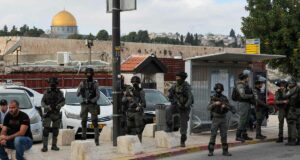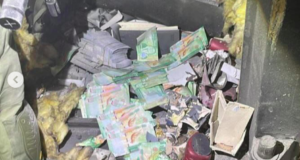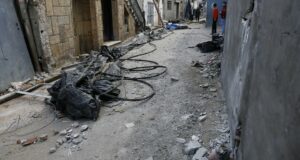17 May 2011 | International Solidarity Movement
On 14 May 2011, the ISM went to Silwan, East Jerusalem after hearing about the tragic death of Milad Ayyash, a Palestinian teenager, who was killed during the Friday demonstrations against the Occupation in Batten Al Hawwa. Milad Ayyash was pronounced dead in the early hours of May 14. His death came as tensions rose between Palestinians and the Israeli army due to the Naqbah demonstrations which occurred all throughout the West Bank, Lebanon, Egypt and the Golan Heights, on the 15 May.
We interviewed Nihad Siam, a Palestinian activist for the Wadi Hilweh Information Centre who also arranges sports activities for the youth in the district in the Maada Centre.
Can you please describe what happened at the Friday demonstrations (13/05/2011) in Silwan, East Jerusalem?
The demonstrations usually begin after the Friday prayers which end in the early afternoon. There are usually violent clashes between the Israeli army and Palestinian residents and this occurs every week. On this particular day, the ‘shubab’ (young men) threw Molotov cocktails at Jonathan’s house (Beit Yehonatan*). These settlers are always making problems for Silwan residents, they have guards and are armed. The settlers in the area, it’s like…choking. They have no right to be here, they make life hard – for what reason?
The Molotov was a reaction against the harassment the Palestinians experience here. There is nothing we can do about it as the police arrest us if we complain against the settlers. This has happened to me. The protest tent that we have now, at the bottom of the hill, was in Wadi Hilweh. The settlers attacked it, I told them to leave, that this was private and one of them said to me; ‘no place is private, this is all ours.’ I reported them to the police but the settler said I had attacked them and I was arrested.
So the Molotov cocktails were thrown, and then what happened?
There were many witnesses on the day who can contest that Milad was sitting away from the shubabs, he was watching from a distance. It was after these Molotov cocktails were thrown that the protestors were shot with ‘dum dums’ (rubber coated steel bullets) by the Israeli army. The shubabs closed the road by burning tyres and at some point at around 2pm, Milad was shot from the roof of Jonathan’s house, by a settler or a settler guard we are not sure. The shubabs threw more stones and it got more intense.
We were told afterwards that inside his body, it was…torn, like…’digging,’ it tore his insides and came out the other side. We have never seen this before, it’s new. The hospital tried to give him 16 units of blood but it didn’t work he was continuously bleeding, His BP was 40 when he got to hospital which is pretty much dead. The family probably wanted things to calm down before they announced his death.
Have the police questioned anyone to find out who shot Milad?
No. Nothing has happened.
Can you tell us a little bit about Silwan and why it is so important to Israel?
Silwan is Old Jerusalem, it started here. There are holy places for Muslims, the Jewish and Christians. This was the City of David 3000 years ago and the history of Silwan goes back 5000 years.
Silwan is made up of 10 to 11 neighbourhoods. There are about 55 000 Palestinian residents living there. The first settlers to move into Silwan were a family made up of approximately 7 or 8 people in 1991. There are now 350 settlers living in the area. They are required to carry arms by law and are also provided with armed security guards. They are a state within a state. They arrest people like they are policemen. They take the Green Line where they want. Israel is the only country in the world without declared borders.
What do you think the future is for Silwan?
‘Dundura’ [Arabic for ‘revolution’] as the shubabs would say! Palestinian people can’t handle the situation anymore, I know someone who told me he feels he cannot breathe. We don’t need new technology or anything they promise, we want to live like the farmers, simple, quiet, restful. We don’t need all these things they want to give us. We are Palestinian people. We are from the beginning of history. Leave us.
*Standing at least 4 stories above the surrounding Palestinian homes. Jonathan’s House, or Beit Yehonatan, has been home to eight settler families since 2004 where it was built without license by an extremist settler organisation, Ateret Cohanim. Ateret Cohanim was founded in 1978 and is dedicated to encouraging Israeli Jews to move to live in East Jerusalem. Analysts say, illegal settlements together with outposts, such as Jonathan’s house, which in total are home to approximately 200 000 Jews, is to jeopardise any peace agreement that might offer Palestinians a state, with Jerusalem as its capital.
 International Solidarity Movement Nonviolence. Justice. Freedom.
International Solidarity Movement Nonviolence. Justice. Freedom.


